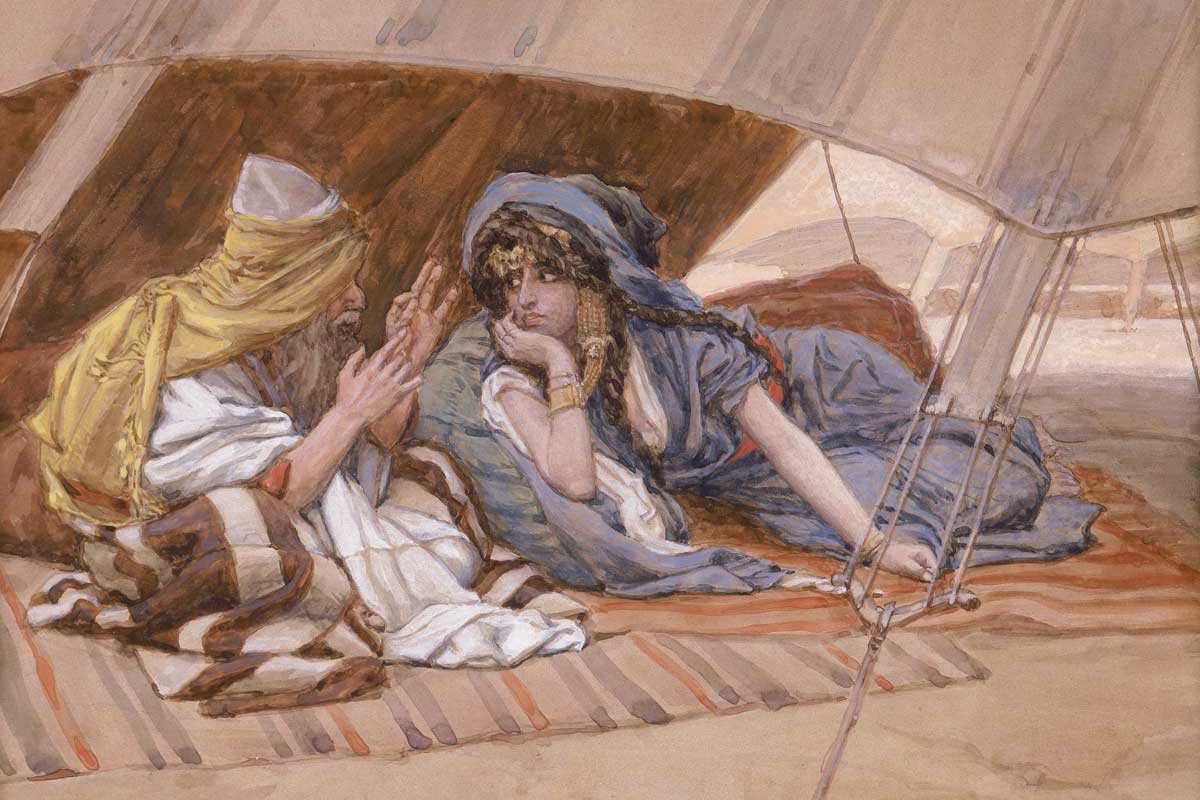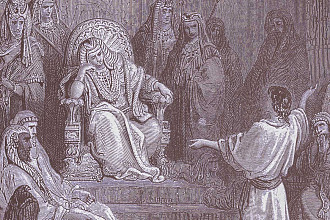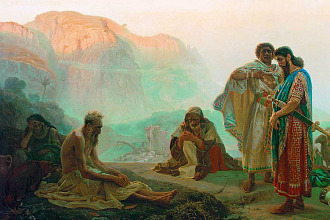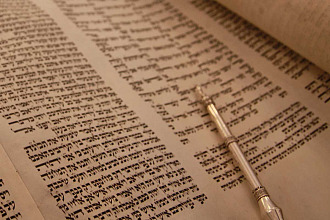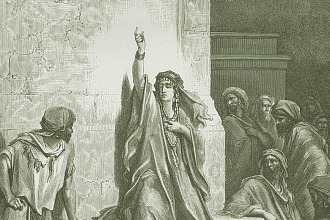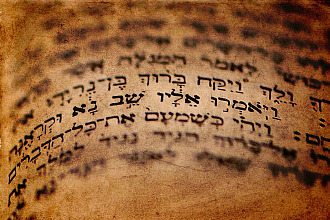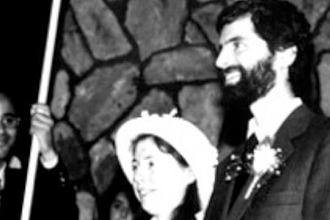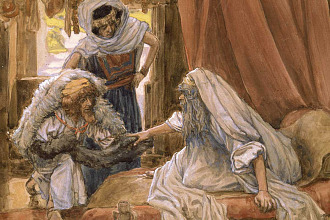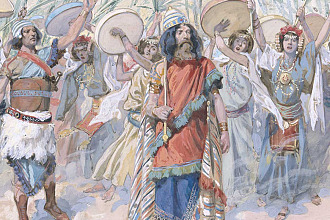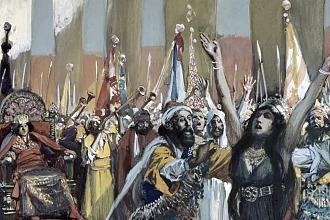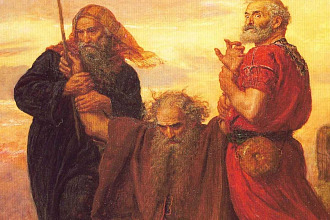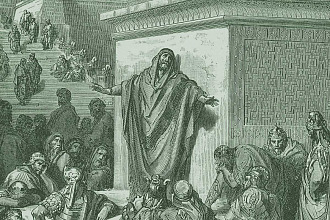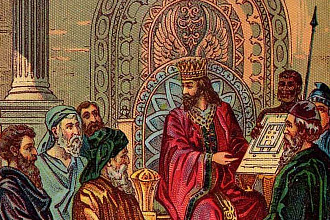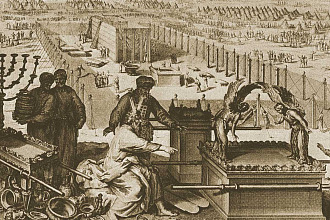Welcome to the first lesson of the Jewish Heritage Scripture Studies. Each lesson in the series builds on the one before it and will help us grow in our knowledge of and love for God.
Each lesson will cover the life of one of our patriarchs or matriarchs and a specific lesson we can learn from their lives. For instance this first lesson is about Abraham, but it is also about faith.
For some people who are well versed in the Scriptures they may be familiar with the facts about each biblical personality, but the topics, for example faith, are topics that we can never mine the depths of. As those who are acquainted with the Scriptures apply the principles of these lessons to their lives they will possess a richer, fuller walk with Adon haShamayim v’haEretz (Master of the Heavens and the Earth). The Bible novice will find these lessons simple to understand and follow, and will experience a life-changing surge of freshness and newness as they come to know God through His Word. Thus, for both the beginner and for the seasoned veteran, the Jewish Heritage Scripture Studies will prove valuable as you apply the lessons to your individual life today.
Unless otherwise noted all the scriptures quoted are from the Jewish Bible, Tanakh, The Holy Scriptures by the Jewish Publishing Society, 1985.
In this series of lessons we will be answering questions such as: Is God concerned for His chosen people? Can the Holy Scriptures be trusted? Will God deliver us from our enemies? Can God help me overcome bad habits? Why does God permit suffering? What happens when we die? How can I have peace (shalom) in my life? How can I have truly satisfying relationships? What can I do about the guilt I carry for past mistakes? How can I get relief from the hurt I have experienced? Can God’s Word give me financial guidance for my current situation? Does God have a plan and direction for my life?
You may have asked yourself some of these same questions when you have thought of the centuries of suffering and persecution that have affected us. Perhaps you have been tempted to give up on God altogether. We challenge you to believe that God is real! His Scriptures can be trusted. His promises will be fulfilled.
He does not forsake us in trials. We must determine to trust Him as Abraham did. God called Abraham, just as He is calling you now. God promises to honor your request for help to understand the Holy Scriptures and to have more faith in Him. He is your Creator. I encourage you to pause for a moment and ask God to give you wisdom and understanding as you continue to read the rest of this lesson.
1. Who was Abraham?
Now this is the line of Terah: Terah begot Abram, ... in his native land, Ur of the Chaldeans...And you shall no longer be called Abram, but your name shall be Abraham, for I make you the father of a multitude of nations. Genesis 11:27, 28; 17:3,5,6
Abraham’s birth name was Abram. He originally lived in a country called Ur. God changed Abram’s name to Abraham, signifying a change that God was doing in Abraham.
2. What did God ask Abraham to do?
The LORD said to Abram, “Go forth from your native land and from your father’s house to the land that I will show you.” Genesis 12:1
God called Abraham to leave the home that he had known and to step out in faith and go to a land that God had not yet revealed to him.
3. How did Abraham respond to God’s command?
Abram went forth as the LORD had commanded him... Abram was seventy-five years old when he left Haran.Genesis 12:4
Abraham stepped out in faith. God commanded and Abraham trusted God and went forth even though he was seventy-five years of age. Are we willing to step out in faith and follow God’s leading as He reveals His will to us through His word?
4. What powerful promise did God give to Abraham?
I will make of you a great nation, and I will bless you; I will make your name great, and you shall be a blessing. I will bless those who bless you and curse him that curses you; and all the families of the earth shall bless themselves by you. Genesis 12:2,3
Note that the promise to Abraham is not just a blessing upon Abraham and the nation that will come from him, but also that all the families of the earth will be blessed by Abraham. This is quite an inclusive promise when it says “all families.” In future lessons we will see exactly how God fulfilled this promise to Abraham’s offspring and to all the families of the earth, including your family.
5. Abraham knew that his wife was too old to bear a child, yet how did he respond to this promise that God would make of him a great nation? What was it about his response that was counted as righteousness in God’s sight?
He put his trust in the LORD; [God] reckoned it to his merit. Genesis 15:6
Abraham trusted in the Lord even though what God had promised was humanly impossible. This is what faith really is. To trust when we can see all the possibilities is not really faith, it is expectation. Real faith believes what God said just because God said it. This is the type of faith that Abraham had. God reckoned or counted this faith to Abraham’s merit as a righteous action.
Not everyone has heard God speak directly to them as Abraham did, but we all have God’s word, the Bible, to show us His plan for our lives. That is why we are reading His Word together right now.
6. After almost 12 years of waiting, how did Abraham try to fulfill God’s promise to make himself a father?
And Sarai said to Abram, “Look, the LORD has kept me from bearing. Consort with my maid; perhaps I shall have a son through her.” And Abram heeded Sarai’s request.... He cohabited with Hagar and she conceived. Genesis 16:2-4
Hagar, Sarah’s handmaid, gave birth to a boy and named him Ishmael. God did not accept Ishmael as the fulfillment of the promise that Abraham’s seed would bless all the families of the earth. Abraham’s faith slipped and he tried to fulfill God’s promise in his own way, with his own plan, and through his own abilities. Abraham was not born with perfect faith. His faith grew and sometimes faltered, but God never gave up on Abraham and Abraham did not give up seeking God. So it is with us also. As we read this lesson and the lessons that follow, our faith will grow and sometimes may falter, but God is not giving up on us and we should continue to seek after Him no matter what mistakes we make.
Remember this lesson: we never have to break one of God’s commands to fulfill one of God’s promises. It is not by our power or abilities that God fulfills His promises, but it is God working through us that fulfills His promises.
7. Through whom did God say the promise would come?
God said, “Nevertheless, Sarah your wife shall bear you a son, and you shall name him Isaac; and I will maintain My covenant with him as an everlasting covenant for his offspring to come. Genesis 17:18,19
8. What was a reality for Abraham at the time this promise was given to him?
(Sarah) Abram’s wife, had borne him no children... Abraham threw himself on his face and laughed, as he said to himself, “Can a child be born to a man a hundred years old, or can Sarah bear a child at ninety?”Genesis 16:1; 17:17
Not only had Sarah not had a child yet, she was past child bearing age. It was humanly impossible for her to have a child. How has your faith stood during the seemingly impossible situations you have been through?
9. What sign did God give him to seal their covenant?
Such shall be the covenant between Me and you and your offspring to follow which you shall keep: every male among you shall be circumcised. You shall circumcise the flesh of your foreskin, and that shall be the sign of the covenant between Me and you. Genesis 17:10, 11
It is interesting that circumcision was given to Abraham after he had had a child with Hagar, Sarah’s handmaid. It could have been a rebuke to Abraham for having had relations with someone who was not his spouse, and a reminder to him, and all his children after him, to keep the marriage covenant pure.
10. When did the promised son finally come?
Now Abraham was a hundred years old when his son Isaac was born to him. Genesis 21:5
God waited until Abraham realized it was impossible for him to accomplish the fulfillment of God’s promise by his own efforts. God reminded him of His power by asking, “Is anything too hard for the LORD?” Genesis 18:14
11. What was the last great test for Abraham?
Some time afterward, God put Abraham to the test. He said to him, “Abraham,” and he answered, “Here I am.” And He said, “Take your son, your favored one, Isaac, whom you love, and go to the land of Moriah, and offer him there as a burnt offering on one of the heights that I will point out to you.” Genesis 22:1,2
How could God make a great nation from Abraham and bless all the families of the earth if his child is dead? Since God brought Isaac out of a barren, dead womb, did Abraham have faith to believe that God could somehow spare the child or raise him from the dead? These questions were the test of faith that Abraham was put through. Do you believe God is able to do the impossible in your life?
12. How did Abraham show his trust in God?
Then Isaac said to his father Abraham, “Father!” And he answered, “Yes, my son.” And he said, “Here are the firestone and the wood; but where is the sheep for the burnt offering?” And Abraham said, “God will see to the sheep for His burnt offering, my son.” And the two of them walked on together. Genesis 22:7,8
During the long 3-day climb up Mount Moriah it dawned on Isaac that they had everything they needed for a burnt offering to God except the sheep. He asked his father the question that must have been burning in Abraham’s mind since they left their tents. Abraham spoke faith even though he did not yet see any sheep. He trusted that God Himself would provide His own burnt offering. In Ur it was not uncommon for people to sacrifice their children to their gods. The people of Ur believed they had to appease their gods. Abraham had faith that the God of Heaven and earth was not a god that needed to be appeased, but rather He was the Almighty God that sought to please us. Abraham trusted that God would provide His own substitute for His own offering.
13. Did God provide an offering for Abraham?
Abraham built an altar there; he laid out the wood; he bound his son Isaac; he laid him on the altar, on top of the wood. And Abraham picked up the knife to slay his son. Then an angel of the Lord called to him from heaven: “Abraham! Abraham!” And he answered, “Here I am.” And he said, “Do not raise your hand against the boy, or do anything to him. For now I know that you fear God, since you have not withheld your son, your favored one, from Me.” When Abraham looked up, his eye fell upon a ram, caught in the thicket by its horns. So Abraham went and took the ram and offered it up as a burnt offering in place of his son. And Abraham named that site Adonai-yireh; whence the present saying, “On the mount of the Lord there is vision.” Genesis 22:11-14
Abraham was willing to trust God even if it meant sacrificing Isaac. God tested Abraham to see who was most important to him, his son or the One who gave him his son. Who or what is most important to you? Are you willing to trust God with whatever is most precious to you? Are you willing to surrender it to God and let God decide if He wants you to have it?
When did Abraham see the ram that God had provided as the substitute for Isaac? It was when he looked up. When did God put the ram in the thicket, before or after Abraham raised the knife? God’s provisions are there for us. It is when we look up to Him in faith that we see His provision for us. Abraham called the place Adonai-yireh, (Lord sees). It is as we spend time with the LORD that we will have faith to see His plans for us.
It is also worth noting that Isaac was a healthy young man at this time and could have easily gotten away from his father, who was now over 110 years of age, if he wanted to. Isaac, Abraham’s son, willingly laid down his life to be a sacrifice.
God, Himself, provided the sacrifice. What a God we have! He simply asks us to believe and to follow His directions.
14. How did God reaffirm His promise to Abraham?
The angel of the LORD called unto Abraham out of heaven the second time, and said, “By Myself I sworn, saith the LORD, because thou hast done this thing, and hast not withheld your son, thine only son: that I will greatly bless thee, and will multiply thee seed as the stars of heaven, and the sands which is upon the seashore; and thy seed shall possess the gate of his enemy; and in thy seed shall all the nations of the earth be blessed; because thou hast obeyed My voice.” Genesis 22:15-18 (The Holy Scriptures, Hebrew Publishing Company, NY, 1930 version)
In the lessons that follow we will see more and more how God has fulfilled this most important promise.
The same God who loved Abraham loves you. God was able to work in Abraham’s life when Abraham stopped trusting in his own efforts and determined to trust totally in God’s power. This same God will work in your life, as you trust Him with every aspect of your life. Since nothing is too hard for the Lord, why not trust Him right now to help you with all the desires of your heart.
This lesson is adapted from "Jewish Discoveries," by Jeff Zaremsky, to buy the printed book, click here.

